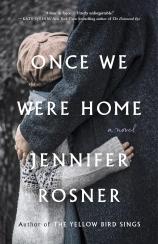Reading Group Guide
Discussion Questions
Once We Were Home

1. Discuss the title. What does the phrase “once we were home” mean to you? How does the idea of home shape the four central characters?
2. With each new chapter, we alternate between the perspectives of Roger, Ana, Oskar and Renata. How are their worldviews similar and different? Why do you think the author made this narrative choice, and how did it affect your reading experience?
3. Did you have a favorite main character? If so, why did you connect to them more powerfully?
4. How is Israel portrayed in the novel? Did anything about its characterization surprise you? What does Israel represent for each of the main characters?
5. How did you interpret the short, italicized sections of the novel told from the perspective of the nesting doll? Were you surprised by what they revealed? Although these sections specifically tell Renata’s backstory, did you find resonances with the experiences of the other main characters? Why do you think the author decided to include these sections?
6. Discuss the very different ways in which Ana and Oskar react to being taken away from the Dąbrowskis. How does that experience shape their relationship in the decades that follow? Why do they struggle to connect with each other, and what ultimately brings them together?
7. How do you understand Eva’s work? What motivates her? Do you sympathize with her actions, especially in the case of Oskar and Ana?
8. Beginning in boyhood, Roger is drawn to riddles, and he goes on to become a philosophy professor. Why do you think he spends his life asking these big questions about identity and belonging? Were you especially drawn to any of his inquiries in particular?
9. Ana is knocked off course by the revelation that she was adopted and may not even be Jewish. As she reflects on the four women who took on motherly roles in her life --- Elżbieta, Chana, Agata and Eva --- she reflects: “No one ever kept hold of me.” Why does the news have such a strong effect on her? How does it change the way she thinks of her own role as a mother? What gets her back on course?
10. Shmuel, the owner of the shop where Oskar works, tells him: “What is a mother if not a nesting box?” What do you think he means? How do you understand Oskar’s preoccupation with carving nesting boxes? How is his relationship to his mother figures similar and different to Ana’s?
11. While we meet Roger, Ana and Oskar early in their lives, when they are young children, Renata’s storyline begins decades later, when she’s in her 20s. Why do you think the author made this structural choice? Did it have an impact on your understanding of Renata’s character?
12. Why does Roger have such a hard time grappling with Renata’s apparent German heritage? Do you sympathize with his initial decision to break things off with her? What ultimately draws them together again?
13. Do you think Renata will ever find out the truth about her childhood and her birth parents, in the way that Ana did? How might that information change Renata’s life? Do you think it’s important to have that kind of knowledge about yourself? Why or why not?
14. Were you aware of the historical events that inspired this novel, namely the post-war efforts to reclaim Jewish children for Israel; the Church’s efforts to keep hold of the Jewish children it harbored; and the kidnapping of non-Jewish, Aryan-looking children to be given to Nazi families during World War II?
15. Discuss the ways in which Oskar and Ana’s experiences reveal the complexities of the Jewish child reclamation effort, and how it could both help and harm children. Do you see these issues as black and white, or would you argue there are moral shades of gray?
16. For pious Christians, keeping Roger in the Church would mean his salvation. Can you understand the viewpoint that would lead papal authorities to hide Roger from his relatives?
17. What do each of the characters wish for at the end of the novel, in front of the Western Wall? What do you think the future holds for them?
Once We Were Home
- Publication Date: March 12, 2024
- Genres: Fiction, Historical Fiction, Women's Fiction
- Paperback: 288 pages
- Publisher: Flatiron Books
- ISBN-10: 125085556X
- ISBN-13: 9781250855565







